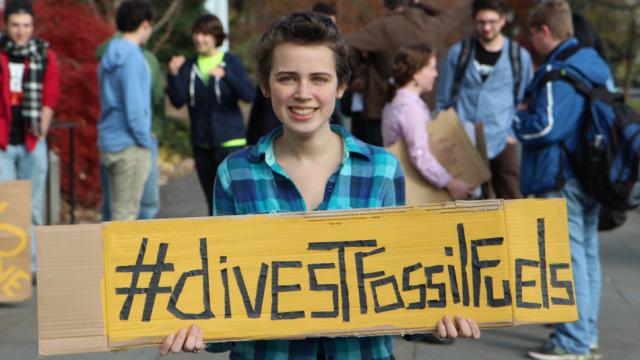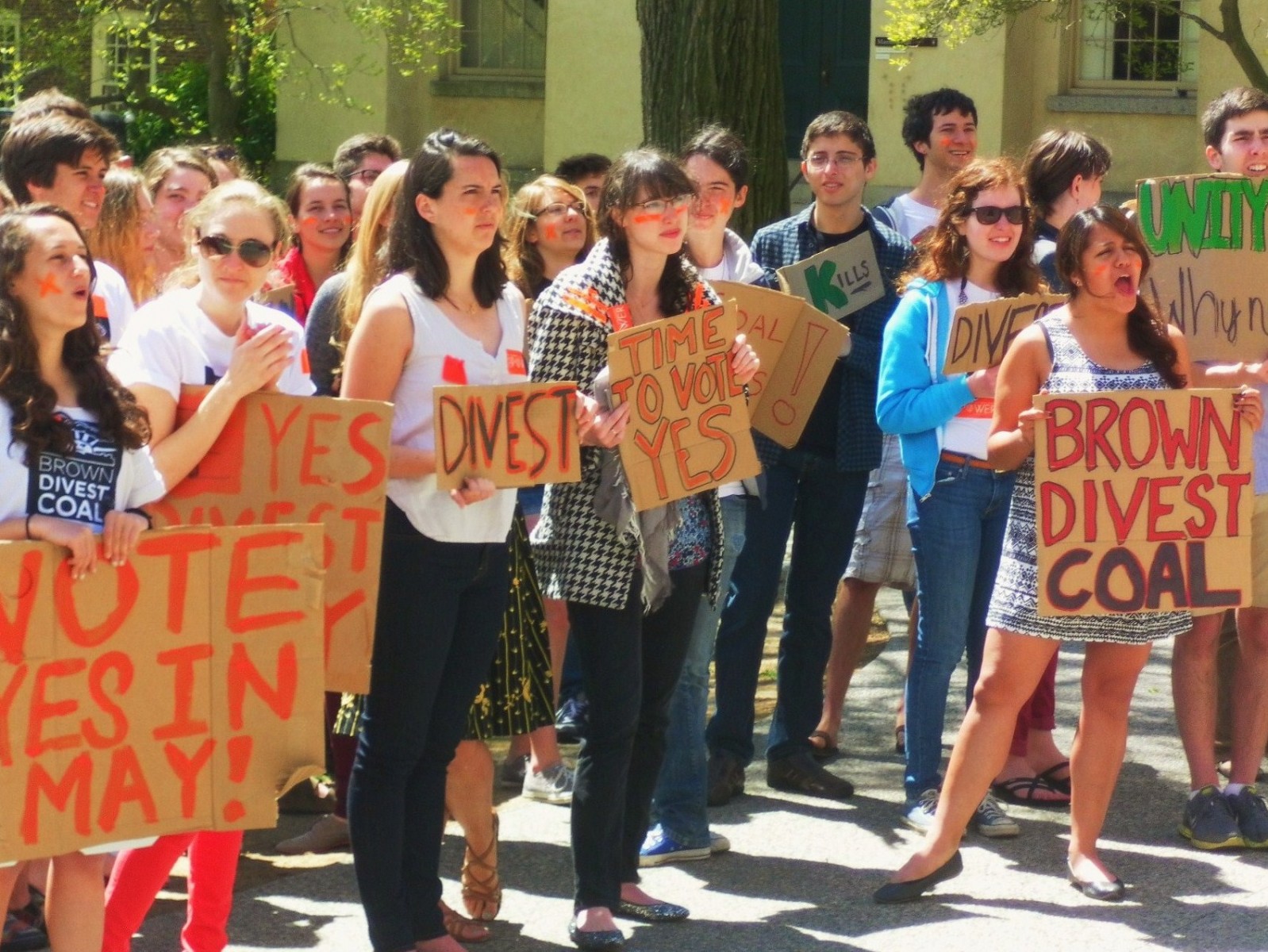
Reflecting on the vast monopoly scandalously accrued by Rockefeller’s Standard Oil during the first Gilded Age, William Vanderbilt remarked in 1879 before the New York Assembly: “I don’t believe that by any legislative enactment you can keep such men as them down; you can’t do it; they will be on top all the time.” Under the framework of state-capitalism, this might still very well hold true for today’s oil sheikhs and coal barons. But all of our hopes are pinned upon the notion that Vanderbilt might have been wrong.
Curtailing the most disastrous future impacts of climate change requires leaving roughly two-thirds of proved coal and oil reservesunburned and underground. How are we going to realistically induce resource owners to leave these reserves – sometimes called “stranded assets” - untapped? It’s not a question enough people are asking. If it were, most climate activists wouldn’t be nearly as focused on persuading shareholders to divest from fossil fuel companies. Although it may mobilize the public in ways that are needed, divestment doesn’t even address the core dilemma.
We are maybe all too familiar with the idea of environmental concern: photos of polar bears stranded on shrinking ice caps or fearful visions of extreme weather. But this can be imagined as an economic concern too. "The estimated costs to the global economy vary depending on the way scientists weight the probabilities of random or uncertain events, and many of the projections that make headlines take extreme cases (e.g. last week's methane pulse story) but they're consistently in the range of tens to hundreds of trillions in damages this century if we fail to act now. We’re talking about mass social immiseration, dwarfing any previous financial crash. As Hugo Chavez remarked at the 2009 Copenhagen summit, “if the climate was a bank, [rich countries] would have bailed it out already.”
Undeterred and unabashed, fossil fuel firms, with already $4 trillion in stranded reserve assets that we can’t afford to burn, are projected to spend another $6.74 trillion over the next decade finding even more carbon to extract. While independent peer-reviewed studies say we need to gradually wean completely off coal and most of our oil dependency by 2050, the studies funded by the producers tell us their business lifespan stretches for about another 100 years for coal and 50 years for oil. They plan to stay in business far longer than our carbon budget permits.
This idea of divestment – e.g. the recent ban on investments in fossil fuel companies by a Dutch bank, Norwegian pension fund, the United Church of Christ, Berkeley City Council, and several small university endowments - as it gains greater momentum, is just another market signal telling resource owners that they should extract and sell as much as possible now rather than later. The boards of directors of these companies don’t live under a rock; they pay attention to government agendas and market signals and make intertemporal economic decisions about how best to maximize returns. They’ve clearly decided to preempt the projected future decline in carbon consumption by accelerating production. That’s why the number of U.S. drilling rigs has quadrupled under the Obama administration, and why China’s coal companies have mined so much in the past few years that they now face the problem of oversupply in a country with 1.3 billion people. All the while, global CO2 output continues to rise, and we still haven’t figured out how to realistically leave more reserves underground.
In need of a better strategy, a few economists have suggested some new ideas. Disinvestment is one idea, but we need more.
Economist Bård Harstad won an EU prize this month for his proposal, echoing recent appeals of Ecuadorian President Rafael Correa, that rich countries should simply purchase the most expensive-to-extract coal and oil from resource owners in order to ensure they’re safeguarded and left underground. In less polite terms, national governments would declare eminent domain over the resources that could collapse the global economy, buy them up, and compensate developing populations for foregoing easy development. Magnates would still make their money and workers’ pensions could be secured through legal settlement, but the negative impacts of burning the huge troves of carbon would be avoided.
Harstad’s proposal has a crucial practical advantage over carbon taxes, energy efficiency standards, and other demand side measures: it understands that, ultimately, we have to ensure reserves are left underground at the source.
Countries with a substantial resource ‘curse’ – e.g. Saudi Arabia, Iran, China, Russia, US, and Canada – are some of the most plutocratic regimes in the world; the social movements and profound institutional changes required to drastically reduce extraction and emission rates could take many decades. While it’s true that countries with more powerful socialist, green or left-libertarian political parties are associated with lower pollution levels, the political Left can’t ignore that most resource-rich countries have no viable progressive movement in sight.
The climate won’t respond to what Denmark, Portugal, Iceland and the indigenous populations of South America do if emissions are simply exported to energy markets elsewhere. The WTO, despite half-hearted appeals of Nicholas Sarkozy and others, won’t even discuss a serious global carbon tariff scheme to fix the ‘free rider’ problem. Buying up and immobilizing the reserves may, therefore, be the only plausible solution.
The difficulty with Harstad’s approach is that any effort to oblige rich countries to pay will end up massively underfinanced, just like the UN’s nearly empty Green Climate Fund. So why should this time be any different?
For the plan to work, we need a viable way to generate the revenue to simultaneously pay the price of fossil fuel conservation while investing in the energy transition at a global scale. The relentlessly rising curve of global energy demand requires that we do both – we can’t just seal the reserves and then tell everyone to deal with higher energy costs and shortages. One approach is to give massive R&D and production subsidies to fuel firms to develop renewable energy sources, while using their untapped coal or oil reserves as collateral. Governments would monitor and own the reserves while companies are incentivized to decarbonize the energy supply.
The first obvious step towards financing this is to transform existing fossil fuel subsidies. National governments are heedlessly subsidizing new coal and oil projects to the tune of $1.9 trillion per year, most prominently in the U.S. ($502 billion), China ($279 billion), and Russia ($116 billion). Even EU development banks are financing state-of-the-art renovations to mining infrastructure to adhere to their own environmental regulations, instead of making the coal companies pay. If lawmakers want a wiser approach, they should subsidize fuel firms under the condition that the grants are put towards advancing renewable energy production and capacity, and that reserves are left underground as collateral.
The financial sector is another vast repository of potential climate funds. Fortunately, an eminently sensible reform to generate needed revenue is in the works, if enough public pressure is put on European lawmakers to follow through.
The European Commission has put forward a proposal for a EU financial transactions tax (FTT) to differentially apply to all exchanges of shares and bonds (0.1%) and derivative contracts (0.01%) involving at least one financial institution residing in participating countries. FTT is designed to ‘throw sand in the wheels’ of unproductive speculation and high-frequency trading, and is expected initially to raise €35 billion per year in national revenue for Germany and the 10 other EU member states that have opted in.
The European Parliament has already approved an initial version of the bill, and is expected to approve an edited final version by the end of 2013. The tax was originally planned to take effect in January 2014, but could be delayed up to six months and watered-down up to 90 percent thanks to a massive political battle waged against it by the UK government and financial market lobbyists. Proponents of the tax have decided that after over $1 trillion in European taxpayer funded bank bailouts and protracted unemployment, surely the financial sector can manage to pay its share in stabilizing the economy and preventing future damages. Polls show that 61% of Europeans strongly support the tax. We’ll have to wait and see what happens in the coming weeks.
Let’s be clear: at least some of the projected €35 billion in tax revenue per year could and should be put towards an EU trust fund to gradually expropriate the two-thirds of coal and oil reserves. If the U.S. were to adopt the tax, it could raise, by a very conservative estimate, another $175 billion in revenue per year. Over the next several decades, if more countries opt-in to the tax, there could be enough revenue, combined with other sources, to negotiate large renewable energy grants in exchange for conservation settlements with the major coal and oil producers, effectively solving much of the climate change problem. A small tax that has no injurious effect on productivity in the real economy could be put towards green tech subsidies and safeguarding reserves, or we could laggardly wait until we all have to pay far more later.
But why should a tax designed to tame financial speculation and curb public debt be put towards fighting climate change? Why should the financial sector, in particular, agree to pay for this? Because it’s in their interest.
We know that burning hydrocarbons beyond our biophysical limits poses huge systemic risk to the whole financial system, but we also know that successfully leaving them underground does too. Huge assets on these companies’ balance sheets would be essentially wiped out. That won’t bode well for the global economy.
Impending ecological disaster, among all major global problems, is perhaps the most likely contender for causing the next major financial downturn. Banks, investment houses, national governments, and workers’ pensions are all implicated in a carbon bubble that could very well burst in the coming decades. Divestment might raise awareness among fund managers and shareholders and help reduce risk in some individual portfolios, but it won’t eliminate costly systemic risk.
Big money managers can’t just be told to divest; they need to take responsibility and finance the transformation of fossil fuel companies into renewable energy companies. The insistence that we should place enormous value on safeguarding fuel reserves as we would gold or nuclear weapons, for both the enormous wealth and destruction they can confer, should be a guiding principle moving forward. It’s the only promising antidote to Vanderbilt’s defeatism at the behest of the Rockefellers of the world.
Ryan Rafaty is a PhD candidate in Politics and International Studies at University of Cambridge and an editor at the Cambridge Review of International Affairs.
3 WAYS TO SHOW YOUR SUPPORT
- Log in to post comments














